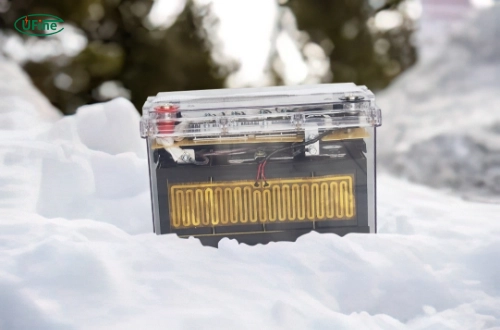Whether you’re looking for the best battery for cold weather in your car, electronics, or other devices, understanding how low temperatures impact battery performance is essential. In this guide, we’ll explore the different types of batteries that perform best in winter conditions, including AGM, lithium-ion, and gel batteries, while providing key tips to enhance battery life in freezing temperatures.
Part 1. Understanding batteries and cold weather
Battery Performance in Cold Weather:
Batteries tend to perform less effectively in cold weather due to slower chemical reactions. Freezing temperatures cause the electrolyte solution inside batteries to thicken, hindering ion movement.
Thicker electrolytes reduce electrical current output, resulting in vehicle starting difficulties and decreased performance for electronic devices. Cold weather also diminishes batteries’ overall capacity, leading to quicker depletion of stored energy.
Importance of Choosing the Right Battery for Cold Weather:
The appropriate battery ensures reliable performance, particularly in colder climates. Batteries optimized for cold weather often feature specialized electrolyte chemistry and improved materials.
Due to their unique design, AGM (Absorbent Glass Mat) batteries are renowned for operating well in cold temperatures. Lithium-ion batteries generally perform better in cold weather than traditional lead-acid batteries.
Opting for a battery tailored for cold weather conditions guarantees robust starting power. It mitigates issues such as starting failures or shortened battery lifespan.
Part 2. Types of batteries suitable for cold weather
AGM (Absorbent Glass Mat) batteries
These batteries are well-suited for cold weather due to their construction, which involves electrolyte absorption into fiberglass mats. This design helps prevent electrolyte thickening in low temperatures, ensuring reliable performance even in freezing conditions.
Lithium-ion batteries
Lithium-ion batteries generally perform better in cold weather compared to traditional lead-acid batteries. They have a higher power density and can maintain their performance more effectively at low temperatures. However, choosing a lithium-ion battery with cold-weather optimization is still essential for optimal performance in cold climates.
Cold-cranking amps (CCA) batteries
Batteries with higher CCA ratings deliver strong starting power even in cold weather. These batteries can provide the electrical current to start an engine in freezing temperatures. When selecting a battery for cold weather, consider choosing one with a higher CCA rating to ensure reliable starting performance.
Gel batteries
Gel batteries use a thickened electrolyte that is less prone to freezing in cold temperatures than traditional liquid electrolyte batteries. Designers craft them to deliver consistent performance even in extreme cold weather conditions.
Deep-cycle batteries
Designers engineer deep-cycle batteries to withstand repeated deep discharges and recharge. This makes them suitable for cold weather conditions where batteries are frequently used, such as in marine and RV applications. These batteries offer reliable performance and longer lifespan in cold climates.
Choosing a battery designed for cold weather ensures dependable performance. It prevents starting problems or reduced battery life in freezing temperatures.
Cold Weather Battery Comparison
Here’s a comparison table for different types of batteries suitable for cold weather, including specifications such as charging/discharging characteristics, Cold Cranking Amps (CCA), and Reserve Capacity (RC):
|
Battery Type |
Construction |
Charging/Discharging Characteristics |
Cold Cranking Amps (CCA) |
Reserve Capacity (RC) |
Cold Weather Performance |
|
AGM (Absorbent Glass Mat) |
Electrolyte absorbed in fiberglass mats |
Quick recharge, low self-discharge rate |
High |
Moderate |
Very good for cold weather conditions |
|
Lithium-ion |
Lithium chemistry |
Rapid charging maintains performance in cold |
Moderate to High |
Low |
Good for cold weather, especially with optimization |
|
Cold-cranking amps (CCA) |
Traditional lead-acid |
Strong starting power in cold weather |
Very High |
Low |
Very good for cold weather, excellent starting power |
|
Gel |
Thickened electrolyte |
Slow discharge rate, consistent performance in cold |
Moderate |
Moderate |
Reliable performance in very cold temperatures |
|
Deep-cycle |
Reinforced plates, deep-discharge design |
Sustained performance in cold, long lifespan |
Moderate |
High |
Effective for long-term cold weather use |
Part 3. Factors to consider when choosing batteries for cold weather
- Battery Type: Consider the type of battery suitable for cold weather conditions, such as AGM (Absorbent Glass Mat), lithium-ion, or gel batteries, known for their cold-weather performance.
- Cold Cranking Amps (CCA): Look for batteries with higher CCA ratings. They provide more substantial starting power in cold temperatures, ensuring reliable engine ignition during chilly mornings.
- Reserve Capacity (RC): Consider the battery’s reserve capacity, which indicates how long it can provide power in case of electrical system failure. Higher reserve capacity is beneficial, especially in cold weather conditions.
- Construction: Evaluate the battery’s construction, including materials and design features, to ensure durability and resistance to temperature fluctuations commonly encountered in cold climates.
- Compatibility: Ensure that your chosen battery is compatible with your vehicle or equipment, considering size, terminal placement, and electrical requirements.
- Warranty: Check the battery manufacturer’s warranty. It assures defects and premature failure, which is particularly important in harsh weather conditions.
Part 4. Tips for using batteries in cold weather
- Keep the battery Charged: Regularly charge it, especially during cold weather, to maintain optimal performance and prevent it from freezing or losing capacity.
- Insulate the Battery: Use insulation or battery blankets to protect the battery from frigid temperatures. This will reduce the risk of electrolyte thickening and prolong battery life.
- Minimize Power Drain: Turn off unnecessary electrical accessories when not in use to minimize the battery’s power drain, preserving its charge and extending its lifespan in cold weather.
- Park in Sheltered Areas: Whenever possible, park your vehicle or equipment in sheltered or heated areas to reduce exposure to frigid temperatures, which can adversely affect battery performance.
- Maintain Clean Terminals: Keep the battery terminals clean and corrosion-free to ensure a secure connection and maximize electrical conductivity, which is especially important for reliability in cold weather.
Advanced Tips for Cold Weather Battery Care
- Use a Battery Heater: Consider using a battery heater in extremely cold regions to keep the battery warm, improving performance.
- Upgrade to High-Performance Batteries: If you’re experiencing frequent battery issues in cold weather, it may be time to invest in high-performance batteries, such as AGM or lithium-ion, designed for winter conditions.
- Regular Inspections: Regularly inspect the battery for any damage or corrosion that could be worsened by freezing temperatures. Replace damaged batteries before the cold season hits.
Artikel Terkait: Why You Need a Lithium Battery Heater for Cold Weather Performance and Longevity
Choosing the right battery for cold weather is essential for reliable performance, especially in freezing temperatures. Whether you opt for AGM, lithium-ion, or gel batteries, understanding their benefits and selecting the best option will ensure your devices and vehicles continue to function optimally throughout winter. Always check the CCA rating, reserve capacity, and battery construction to match your needs. Don’t let the cold weather catch you off guard—invest in a battery designed for winter conditions today!
Part 5. FAQs
-
Which batteries are best for cold weather?
AGM (Absorbent Glass Mat), lithium-ion, and gel batteries are among the best options for cold weather due to their ability to maintain performance in low temperatures. -
Do you need a particular battery for cold weather?
Yes, choosing a battery optimized for cold weather conditions is essential to ensure reliable starting power and prevent performance issues in chilly temperatures. -
Do lithium batteries work well in cold weather?
Lithium batteries generally perform better in cold weather than traditional alkaline batteries. They have a higher power density and can maintain their performance better at low temperatures. -
What is the most temperature-resistant battery?
Lithium-ion batteries are known for their temperature resistance and ability to perform well across various temperatures, making them highly versatile in multiple climates. -
Are lithium batteries better than alkaline in cold weather?
Lithium batteries are generally better suited for cold weather than alkaline batteries. They have superior performance and reliability and maintain their power output even in freezing temperatures.
Related Tags:
More Articles

Where to Find the Right 18650 Battery Wholesale?
Discover how to choose a reliable 18650 battery wholesale supplier, compare prices, ensure safety, and avoid common buying mistakes.
18650 Battery Short Circuit: Risks and Safety Tips
Discover what happens during a 18650 battery short circuit, warning signs, and how to avoid fire, damage, and hazardous failures in your devices.
LiPo Battery Discharge Rate Guide & Calculation Tips
Understand LiPo battery discharge rates, C-ratings, and how to calculate max current. Essential guide for RC, drones, and electronics users.
High‑Capacity 3S LiPo Batteries: 5000 mAh vs. 10000 mAh
Compare 3S LiPo 5000mAh vs 10000mAh batteries by weight, power, and use. Find the best fit for your drone, RC car, or boat setup.
Top 5 Applications for Small 3S LiPo Batteries
Small 3S LiPo batteries power drones, RC gear, wearables, and robotics with high energy and low weight. Making them ideal for compact electronics projects.




